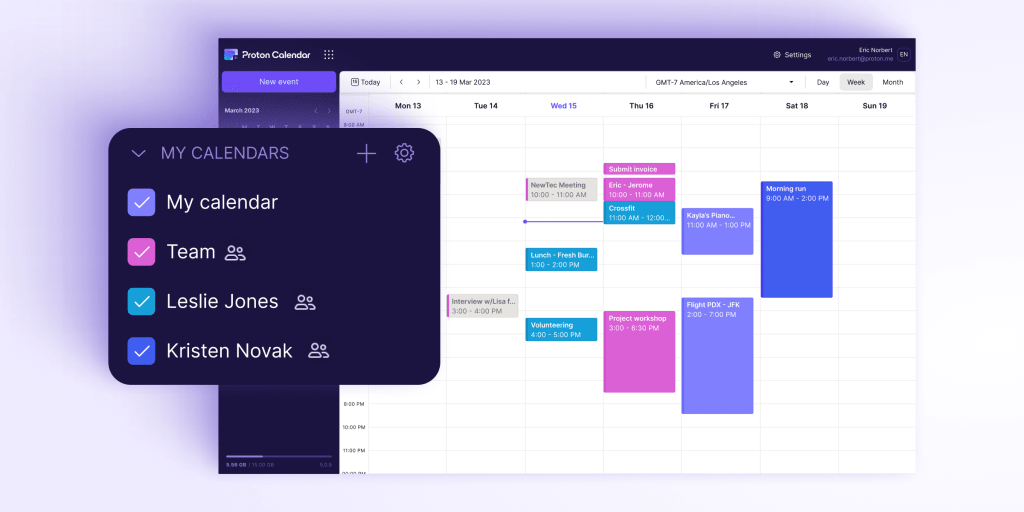It’s hard enough remembering your own schedule, much less your partner’s, your family’s, and your colleagues’. Today, we’re making it easier and safer to share your calendar to keep everyone in the loop. In addition to public calendar links, Proton Calendar now lets you share your calendar directly with anyone who uses Proton. This maintains Proton Calendar’s end-to-end encryption and gives you greater control over who can access or edit your calendar.
Shared calendars make planning events together easier without sacrificing your privacy. Say goodbye to missed appointments, scheduling conflicts, and back-and-forth messages trying to find a convenient time.

Collaborate better with co-workers
Scheduling meetings and coordinating projects can be a hassle if everyone is not up to date. Proton Calendar’s new sharing feature makes office life much easier by allowing you to easily share your schedule with your team members.
When everyone shares their calendar, anyone can find a time that works for the whole team at just a glance. Schedule meetings with ease, avoid missed appointments, and ensure your team can see all relevant project milestones.
Sharing your calendar with other members of the Proton community brings added security benefits:
- Calendars shared with other Proton users benefit from end-to-end encryption, unlike those shared via a public link. Only people you invited have access to your calendar.
- You can set editing permissions to ensure only relevant team members can edit shared events.
- You can also revoke access for specific people at any time without affecting anyone else on the team.
You can also share your calendars directly with people who use other calendar providers (for example, you can share it with Google Calendar users), but your recipient’s calendar provider won’t maintain our end-to-end encryption.
Keep up with your family
When it comes to family life, staying organized is key. Sharing your calendar with your partner and other family members simplifies planning family vacations or even just family dinners.
Whether you need to arrange your kids’ activities, find out what your partner planned for the weekend, or what restaurant you’re supposed to meet your parents at for lunch, sharing your calendar lets you coordinate in real time with everybody. Proton Calendar lets your whole family view upcoming events at a glance while preventing any third parties from accessing this sensitive information.

How to share your calendar
You can easily share your calendar from the Proton Calendar web app. Once a calendar has been shared, you can view it on our web and mobile apps.
- Click the … button next to your calendar and select Share. Then choose Share with Proton users.
- Type in your contact names and choose the desired permission level (viewing or editing)
An invitation will be sent to the contacts you selected over email. You can learn more about how calendar sharing works in our Support section.
Protected by end-to-end encryption
Your calendar is full of sensitive information. It’s a record of who you’ve had meetings with, what your family plans are, and how you spend your days. This information can reveal a lot about you and what you do, which is why we created Proton Calendar.
Just like your email, the calendars you share with other members of the Proton community are end-to-end encrypted. This allows you to control who has access to your schedule. No one, not even Proton, can access your calendar unless you share it with them.
Our improved calendar-sharing feature combines the convenience of shared schedules with the privacy of Proton.
